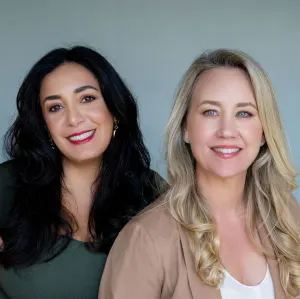When their husbands died suddenly about three years ago, a mutual friend connected Eloise Bune and Karine Nissim on Instagram. They got to know each other and became part of one another’s support system as they navigated the aftermath of being widowed—and the effect that grief has on doing everyday tasks.
“Executive functioning can become impaired, a lot of things become much harder, and there is more to do than ever when your life takes an unexpected hit,” Nissim says. “I needed someone to walk my dog, drive my kids to school, and sit with me to open mail and help me get organized about paying bills and canceling subscriptions that my husband started.”
Navigating grief can be both overwhelming and isolating. Swedish researchers in 2021 found that people who had experienced grief had an increased risk of death from heart failure—in part because of how stressful the experience is. Last spring, Surgeon General Dr. Vivek Murthy called the grief and emotional pain from COVID-19 the “invisible cost of the pandemic” and a key contributor to the ongoing loneliness epidemic.
But grief can also bring people together. For Bune and Nissim, “our friendship became the silver lining during a really dark and difficult time of rebuilding ourselves after trauma hit,” Nissim says.

They also bonded over their shared entrepreneurial experience. Nissim and her late husband Aaron Hirschhorn had founded the pet-sitting site DogVacay (which merged with Rover in 2018) and she started mask-shirt combo company Shmask at the onset of the pandemic. Bune had founded card-writing service Handwrite.co and cofounded glamping site Tentrr with her late husband Michael D’Agostino. (In 2018, after the birth of her twins, Bune stepped away from Tentrr, which filed for Chapter 11 bankruptcy and was ultimately liquidated in December.)
The two sensed an opportunity to use their experiences to help others through their trauma—which they estimate affects some 120 million individuals every year. “We felt that we, through our own experience,” Nissim says, “could understand how to solve this extremely fragmented experience for people as they attempt to move through any kind of trauma, loss, or illness.”
The result is DayNew, an app that launches today with a set of organizational, emotional, and social support tools. Users can join DayNew for free by answering an intro questionnaire that helps deliver an AI-driven road map for their various needs based on their trauma type. The responses also help generate a checklist designed to help users categorize and prioritize administrative, legal, and financial tasks, as well as offer links to additional resources, based on what the user is experiencing (i.e. loss, divorce, or illness).
DayNew’s founders also hope to build a user community that will become a cornerstone of the app’s experience. Everyone can publish responses to DayNew’s reflection prompts on its Community Journal. But for $5 a month, users can get verified to open up commenting features and the ability to direct-message other users. Nissim says the fee “enables the community to stay safe and for people to feel a little bit more comfortable connecting with other people.”
Nissim and Bune have prioritized making DayNew’s community accessible for a relatively low monthly fee because they see it as potentially the most impactful part of its offering. They’re further building out that community with virtual workshops ($36)—which will feature experts in Q&A sessions on topics like how grief affects the brain—and IRL retreats. The first retreat, slated for July 11-13 in Mexico, will highlight various methods for healing, with sessions from experts and the opportunity to connect with other members. Bune says these features are designed to “lift the app off the screen and turn it into something that can develop the connective tissue within our DayNew community.”
With DayNew, the duo are hoping they can help people move through their grief and encourage real connection with others going through something similar who want to lend in-depth support. “Casserole and flowers are great,” Nissim says. “But they may not actually make a dent.”
Melden Sie sich an, um einen Kommentar hinzuzufügen
Andere Beiträge in dieser Gruppe

The role of the CFO is evolving—and fast. In today’s volatile business environment, finance leaders are navigating everything from unpredictable tariffs to tightening regulations and rising geopol

In June, Google released its newest smartphone operating system, Android 16. The same month, Apple previewed its next smartphone oper


I’ve worked at the bleeding edge of robotics innovation in the United States for almost my entire professional life. Never before have I seen another country advance so quickly.
In


Restaurant industry leaders are excited for

Elon Musk’s anger over the One Big Beautiful Bill Act was evident this week a
